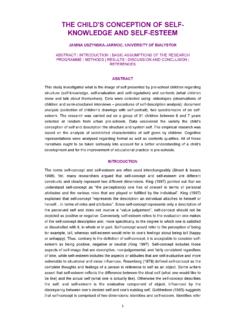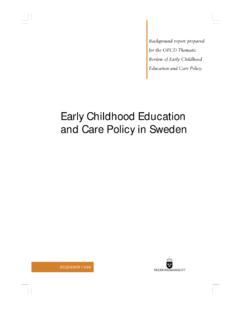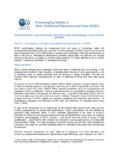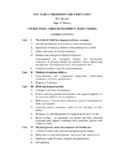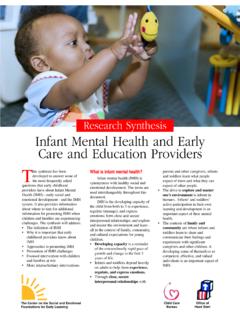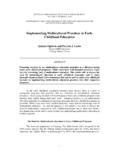Transcription of Current Theories Related to Early Childhood …
1 1 Current Theories Related to Early ChildhoodEducation and Preschool as Frames ofReference for Sustainable EducationUlla H rk nenUniversity of Joensuu, FinlandAbstractThis paper focuses on different Early Childhood education and preschool back-ground Theories as theoretical frames of reference for sustainable education andsustainable development. In Finland, for thirty years, theoretical frames for earlychildhood education and preschool have been outlined through Bronfenbrenner secological approach, Vygotsky s developmental theory, didactic Theories and thepsychological Theories of learning, among which the latest is the constructivist theoryof learning. This article presents a critical survey of the abovementioned theoriesand stresses the issues, Related to the solutions, offered to Early Childhood educationand preschool by these Theories .
2 Finally, a basis is laid for the argument in favour ofa comprehensive systems educational theory that would also respond to the chal-lenges of sustainable education and sustainable development. The author has stud-ied pedagogical systems thinking in the Theories of history s , the sources are approached as a textual material that isanalysed in accordance with content analysis principles. While going through thetexts, the researcher identifies central categories, conceptions and their meanings inthese Theories and makes an interpretative and representative comparison. Fromthe constructivist point of view, the interpreter s own historical and cultural back-ground and pedagogical experience influence the article is an attempt to answer the question as to how the systems char-acter of educational thinking can be observed in these Theories and how systemstheory can be developed to suit the needs of Early Childhood education , preschooland sustainable education .
3 Finally it will be concluded that in order to be able tomake sustainable education a part of Early Childhood education and preschool anew versatile theoretical frame of reference should be words: Early Childhood education ; preschool; primary school; sustainabledevelopment; sustainable education ; Bronfenbrenner s ecological theory;Vygotsky s socio-cultural theory; didactics; constructivism; systems main concepts, ideas and structure of presentation are outlined in this introduc-tion. In order to contextualise the message of this article some important issuesabout the author s home country Finland will be introduced at Finland preschool is understood as Early Childhood education for six-year-olds.
4 The newest national preschool curriculum was adopted in 2000. Early child-hood education means care, education and teaching for children from the birth toseven years of age. Primary school starts at the age of seven. Preschool has manythings in common with the first two grades at school. In Finland sustainable devel-2opment is a valuable goal also for education at day care centres and at schools. Butwhat does the concept of sustainable development mean?In Finland, Doctor Mauri hlberg has studied sustainable development andeducation Related to it for a long time. hlberg (2003) writes that sustainable de-velopment is a global goal, set in order to ensure the survival and continuation of lifeon earth.
5 Sustainable development is development in which real long-term needs ofboth present and future human generations are met as optimally as possible. Thismeans that not only the basic individual biological needs, but also real economical,cultural and social needs ought to be met. hlberg (2003) proposes that there are three strands in Environmental Edu-cation: 1) education and learning about environment, 2) education and learning inenvironment and 3) education and learning for environment. The last one comesnearest to education for Sustainable Development. In addition to ecology, econom-ics, quality improvement, organisational development, peace education , populationeducation, human rights education , etc.
6 Are important aspects of education for Sus-tainable Development. education for Sustainable Development, when at its best, isintegrating best Theories and best practices, testing constructed new Theories boththeoretically and empirically when it is possible (See also hlberg & Filho, 1998).I agree with hlberg and I understand sustainable education as educationfor sustainable development. (2001: 21) has also used the same con-cept education for sustainable Hungarian doctor Gyula Lakatos (2002: 20-27) has written about sus-tainable development and referred to some pivotal publications in this area ( et al., 2001; Hopkins et al., 1996; Jakucs & Lakatos, 1990; McKeown etal., 1999; Palmer, 1998; Tilbury, 1995).
7 Sustainable development is a conceptthat focuses the attention of human beings on the conditions of continuity of a utilitarian view of the environment requires that we should understand theprinciples of sustainable development, the interdependence of environment, economyand social systems, so that we could use natural resources and the environmentefficiently, while preserving the homeostasis of the Earth. The society, based on asustainable form of development, is a dynamic and a permanently changing utilising natural resources, investments, technological improvements and insti-tutional systems in the process of permanent changes in conformity with the de-mands of the present and the near future sustainable development is a way to satis-fying the demands and hopes of the present generation without hazarding similaraspirations for future (2002: 20-21) writes that education is the key factor in ensuringsustainable development.
8 It is the process of education and learning that leads to anever-growing number of people, who are sensitive to environmental issues. Learn-ing, as well as teaching, can be discerned so that learning is not a precondition oflife, but can increasingly become one of its concomitants. To view it from a tradi-tional aspect, the idea of learning through life means education outside the schoolsystem, taking place after the school is finished. It can be stated that learning isactually an endless process, having innumerable forms in human life outside the schoolsystem. Referring to Csobod et al. (2001) Lakatos writes that education for sus-tainable development trains teachers, who are capable of coupling their ecologi-cal, economic and environmental knowledge with other subjects and main idea of this article is to focus the attention specifically on the area ofearly Childhood education and preschool.
9 Sustainable development is one of the3principles applied throughout all these educational areas. We ought to educate teach-ers, who are sensitive to environmental issues. They ought to be able to educatechildren in practice to become sensitive to nature. But the question is also - as it issaid above - about Theories . What kind of Theories can organise the practice, theory,subjects and thinking?During the past decades, Early Childhood education and preschool in Finlandhave been outlined mostly on the basis of several Theories from developmental psy-chology. This article will make a reference to Bronfenbrenner s and Vygotsky stheories; Piaget will not be touched upon this time. Also the Theories of school teachinghave been applied to Early Childhood education and preschool in Finland.
10 Someexperts have favoured the so-called didactic Theories . Lately the vogue has broughtto the foreground the psychological Theories of learning, especially the constructivisttrends in mentioned Theories rest on developmental psychology, didactics and psy-chology. The article features a critical attitude towards these Theories because theydo not by themselves represent the phenomena of care, education and Childhood education and preschool call for a comprehensive pedagogical theorythat can pertain to numerous lines of activities of the child. The theoretical state ofearly Childhood education and preschool has a great meaning for all spheres ofpedagogy, including sustainable development and sustainable author s purpose in a broader sense is to elaborate a comprehensiveearly Childhood education and preschool theory.
